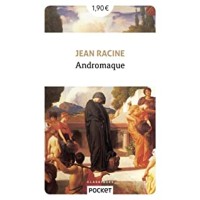
Andromaque - Suivie de Andromaque d'Euripide
تأليف : Jean Racine
النوعية : الفكر والثقافة العامة
نعتذر، هذا الكتاب غير متاح حاليًا للتحميل أو القراءة لأن المؤلف أو الناشر لا يسمح بذلك في الوقت الحالي.
حفظ
Andromaque - Suivie de Andromaque d'Euripide par Jean Racine Racine songe sans nul doute à l'actrice Du Parc, sa maîtresse, quand il écrit Andromaque, où il transpose Les tourments qu'elle lui fait subir... Captive troyenne enlevée par Pyrrhus
avec son fils Astyanax, Andromaque, veuve d'Hector, doit choisir : l'épouser ou voir périr son enfant, comme les Grecs l'exigent. Mais peut-elle céder à ce bourreau séduisant qui a massacré sa famille et incendié sa ville ? Il y a un fleuve de sang entre eux.La haine, la douleur et La fidélité à Hector doivent l'emporter. Dans le même temps, dans L'ombre, Hermione, ainsi qu'Oreste, malheureux éconduits par une chaîne amoureuse, conspirent...
Andromaque - Suivie de Andromaque d'Euripide par Jean Racine Racine songe sans nul doute à l'actrice Du Parc, sa maîtresse, quand il écrit Andromaque, où il transpose Les tourments qu'elle lui fait subir... Captive troyenne enlevée par Pyrrhus
avec son fils Astyanax, Andromaque, veuve d'Hector, doit choisir : l'épouser ou voir périr son enfant, comme les Grecs l'exigent. Mais peut-elle céder à ce bourreau séduisant qui a massacré sa famille et incendié sa ville ? Il y a un fleuve de sang entre eux.La haine, la douleur et La fidélité à Hector doivent l'emporter. Dans le même temps, dans L'ombre, Hermione, ainsi qu'Oreste, malheureux éconduits par une chaîne amoureuse, conspirent...
المزيد...



